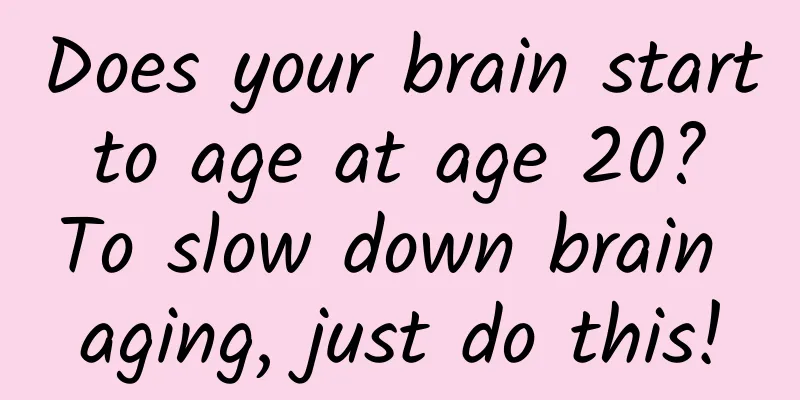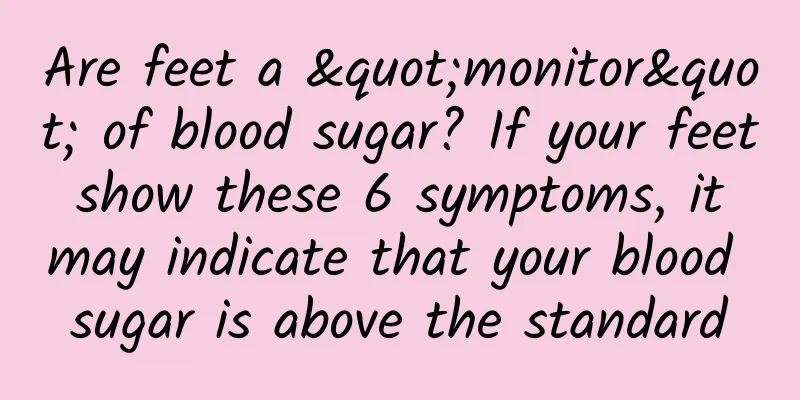Does your brain start to age at age 20? To slow down brain aging, just do this!

|
Author: Xu Jun, Chief Physician, Beijing Tiantan Hospital, Capital Medical University Reviewer: Li Jingjing, Chief Physician, Beijing Tiantan Hospital, Capital Medical University We know that when people reach a certain age, their skin will gradually deteriorate, their bones will slowly be lost... The functions of various organs in the body will gradually decline, including our brains, which will also age, and the state of brain health will gradually transform into sub-healthy brain and brain disease. For example, poor memory, lack of concentration, frequent fatigue, lack of interest in new things, inability to do work that you used to be good at... These symptoms may be manifestations of brain aging and sub-health. 1. Does the brain start to age at the age of 20? There are actually two lines of brain development. We must not imagine that before the age of 20, the brain is only building and not destroying, and after the age of 20, the brain is only destroying and not building. This is not true. We should imagine the human brain as a constantly running Tai Chi diagram. For example, the first three months of pregnancy are very important because at this time, the fetal brain will produce a large number of new neurons, but at the same time, the microglia and astrocytes in the brain will cut off inappropriate connections like a pair of scissors. If the brain connections are disorganized during this stage, including after birth, it is easy to get autism. Therefore, the creation and destruction of brain cells is a dynamic balance process. Figure 1 Original copyright image, no permission to reprint So why do we often say that 20 is a physical peak? According to the Yellow Emperor's Classic of Internal Medicine, women's development is basically completed at the age of 20, and men's development is basically completed at the age of 20, based on the rhythm of "sevens". In any case, the subsequent development process is still a dynamic process of rebirth and destruction. However, since the new things in the brain are much weaker than those that are destroyed, it is impossible for the brain to be like a gecko, which can lose its tail and grow a new one, or like a sea cucumber, which can vomit out its intestines and then grow them back after a while. This is impossible for the brain. Therefore, for the brain, we need to implement brain health intervention throughout the life cycle, pay attention to eugenics from birth, and conduct at least 12 years of systematic planned learning in the adolescent stage to increase our brain reserve or cognitive reserve. For most medical workers, they still need to spend 5 years in college, and even another 3, 5, or 6 years in graduate school, or even lifelong learning. Continuous learning in adulthood will increase your brain reserves and cognitive reserves. When we reach middle age, generally around the age of 45, we have to fight against various chronic diseases such as hypertension, diabetes, hyperlipidemia, and exogenous pathological injuries. Once a disease occurs, timely diagnosis and stratified and graded management are very important. A rich social network, a scientific and standardized work and rest schedule, self-regulation of diet and exercise, and active health check-ups to regularly identify problems are all things that need to be paid attention to throughout the life cycle. 2. How to delay brain aging? In the past, we liked to use a pizza or a big pie to describe what causes brain aging or brain disease, one by one, including free radical damage, stem cell failure, vascular function damage, or some abnormal physical and chemical stimulation. In fact, we can use three dimensions and three rings to put them together. The first is to improve the brain's cognitive reserve, including effective learning, expanding social networks, mastering new skills, and learning throughout life. This is one way to improve the brain's cognitive reserve. Second, effectively managing and controlling existing diseases that may cause brain damage, actively treating various chronic diseases, and controlling chronic diseases to a state of no progression, or as slow progression as possible, is in itself a protection for the brain. The third one, which is also very important, is to reduce various inflammatory damages. Figure 2 Original copyright image, no permission to reprint When these three big pie are put together, they have a lot in common. The first is exercise. Exercise can not only improve brain cognitive reserve, but also play a non-drug intervention role in chronic diseases, and at the same time reduce inflammatory damage to the brain. The second is scientific and regular sleep. We should especially emphasize that some of them are occupational, such as the long-term night shift work of medical staff, which is indeed harmful. If you want to intervene in this harmful behavior of staying up late, you may need to adjust the sleep cycle appropriately. If you encounter sleep disorders after working the night shift, you need to use a combination of drugs and non-drugs to effectively protect yourself. The third is dietary control. In terms of nutrition, there are inflammatory diets and non-inflammatory healthy diets. For example, fried, high-carb foods are generally considered to be inflammatory. If you eat too much of a bad diet, probiotics will be restricted, and harmful bacteria may increase, which will produce various endotoxins to damage our brains and affect other organ systems. Therefore, cognition, brain reserve, exercise, sleep, and diet continuously promote each other. It does not mean that good health can be achieved by managing just one of the links well. Aging is more like a pathological thing that cannot be avoided, but what we can do is to slow down the aging process so that the health of the brain can be maintained longer. |
<<: In addition to cleanliness, giving the elderly a bath has unexpected benefits!
>>: How Rice and Arabidopsis Change After 120 Days of Space Travel
Recommend
Is the click-through rate of products in Douyin’s live broadcast room low? Share 5 tips!
If a live broadcast is likened to the process of ...
Why can't the iPhone be made in the U.S.? Jobs gave the answer
If Jobs' attempt to manufacture Apple compute...
Apple's ten years of courting China
Apple is trying to please China. In the new iPhon...
Color TV giants: On the one hand, they are trying to attract customers by offering low prices, and on the other hand, they are struggling to find ways to make money
Recently, Apple, LeTV, Alibaba and other companie...
Fission is complete, how to do refined user retention work
At the end of the previous article "There se...
The end of a skier's career is a medal, but the end of your skiing career may be a hospital...
With the Winter Olympics being held, ice and snow...
Product Promotion Operation | How to improve user activity of low-frequency products?
Having 1 million users is not a problem. The real...
How much does a piece of Cordyceps sinensis cost in 2020?
How much does a piece of Cordyceps sinensis cost ...
4 key data of the top 10 short video applications!
Do you know which short video app is used the lon...
How to survive programming 80+ hours a week?
I left my computer, walked into the bathroom, and...
New strategic key metal mineral "Niobium Baotou Mine"! The latest discovery by Chinese scientists
Recently, Chinese scientists discovered a new min...
Wrapped in 8 pieces of clothing and 2 layers of thick quilts, a five-month-old baby almost had an accident! The consequences of dressing like this in winter are very serious
The weather is getting colder Is everyone Have yo...
Android high imitation taxi and other software project source code
Source code introduction This project is modeled ...
55 new confirmed cases in 31 provinces, autonomous regions and municipalities, including 1 local case in Zhejiang!
People's Daily, Beijing, March 27. According ...









